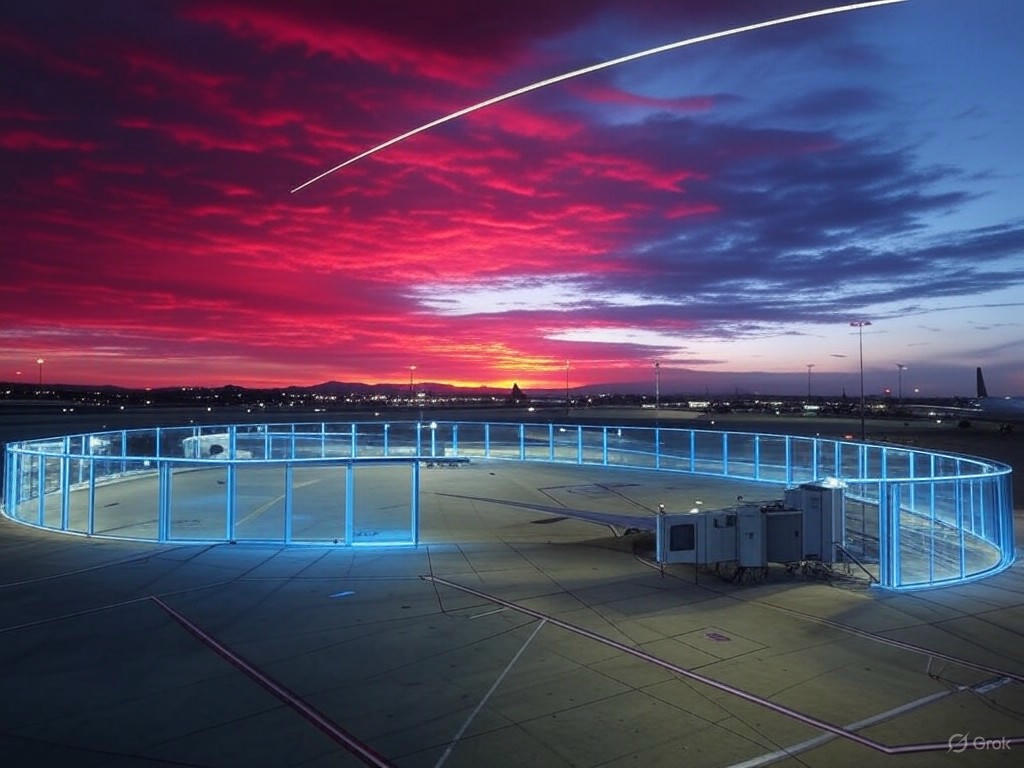
Netanyahu vows action after Huthi missile strike near airport
Netanyahu’s Strong Response to the Houthi Missile Strike
Have you ever wondered how a single missile could change the dynamics of an entire region? The Netanyahu Houthi missile strike has done just that, drawing global attention to escalating conflicts in the Middle East. Today, Israeli Prime Minister Benjamin Netanyahu pledged a forceful retaliation against the Houthi rebels and their Iranian supporters after a missile from Yemen landed perilously close to Ben Gurion Airport, sparking panic among travelers and highlighting vulnerabilities in Israel’s defenses.
This incident isn’t just another headline—it’s a stark reminder of the ongoing threats facing civilian infrastructure. Netanyahu took to social media platform X to declare, “Attacks by the Houthis emanate from Iran. Israel will respond to the Houthi attack against our main airport AND, at a time and place of our choosing, to their Iranian terror masters.” His words underscore a resolve that’s hard to ignore, especially in the context of the Netanyahu Houthi missile strike that shook the nation.
Imagine the chaos: passengers rushing for cover in a bustling airport terminal, all while the world watches. This event marks a critical escalation, with Netanyahu emphasizing that such aggression won’t go unanswered. It’s a moment that could redefine Israel’s security strategy moving forward.
The Far-Reaching Impact of the Netanyahu Houthi Missile Strike
The Netanyahu Houthi missile strike targeted Ben Gurion Airport, Israel’s vital gateway to the world, handling millions of passengers each year. This wasn’t a random act; it was a calculated move by the Houthis to disrupt daily life and instill fear, showing their growing reach in regional conflicts. While no one was injured, the psychological toll on travelers was immense, with reports of widespread panic echoing through the terminal.
What makes this strike so concerning is its precision and intent. The Houthis, backed by external forces, are demonstrating advanced capabilities that threaten not just military targets but everyday civilians. For Israel, this is more than an attack on infrastructure—it’s an assault on normalcy. As you think about global travel, can you picture how something like this might affect your own plans?
This episode highlights the need for robust defenses. Countries worldwide are watching, learning from Israel’s response to ensure their own critical sites remain secure.
Shifting US Stance on Israel’s Netanyahu Houthi Missile Strike Response
In a surprising turn, the United States appears to be softening its position on Israel’s potential retaliation to the Netanyahu Houthi missile strike. An Israeli official shared with The Jerusalem Post that Washington now recognizes Israel’s need to act, despite earlier reservations. This evolution could give Netanyahu the green light for a more assertive approach.
“The administration has never vetoed an Israeli strike, but the message was, ‘We’re handling it,'” the official noted. Yet, with the Netanyahu Houthi missile strike escalating tensions, that hands-off attitude has shifted. NSC Spokesman James Hewitt reassured that US operations against the Houthis will continue independently, with over 1,000 strikes already executed to curb their threats.
Does this mean we’re seeing a new era of coordination? Absolutely—it suggests allies are aligning more closely, potentially preventing further attacks. For those following international politics, this development offers a glimmer of hope for de-escalation through partnership.
Historical Background of Conflicts Involving the Netanyahu Houthi Missile Strike
The Netanyahu Houthi missile strike doesn’t stand alone; it’s part of a longer history of confrontations. Israel has struck Houthi targets in Yemen five times before, but recent pauses under various administrations had created a fragile calm. Now, this latest incident has reignited old grudges, linking back to broader tensions with Iran.
Think about it: the Houthis, often seen as proxies, are amplifying Iran’s influence in the region. Netanyahu’s statements tie this directly to that narrative, warning that inaction could embolden further aggression. It’s a cycle that’s been repeating, and understanding it helps us grasp why this strike feels like a tipping point.
If you’re curious about preventive measures, experts suggest bolstering intelligence sharing among allies as a key strategy to break such patterns.
Netanyahu’s Direct Warning to Iran Following the Missile Strike
In discussions with Cypriot President Nikos Christodoulides, Netanyahu made it clear: the Netanyahu Houthi missile strike demands a response that reaches Iran’s doorstep. “We will not tolerate this and will take very forceful countermeasures against them,” he stated, pinning the blame on Iranian support.
This isn’t just rhetoric; it’s a signal that Israel might expand its actions beyond Yemen. By framing Iran as the mastermind, Netanyahu is calling out a larger threat. What if this leads to broader strikes? It could reshape alliances and force diplomatic talks.
Broader Regional Effects Stemming from the Netanyahu Houthi Missile Strike
The Netanyahu Houthi missile strike has ripple effects far beyond Israel, impacting maritime routes in the Red Sea where Houthi attacks on ships have raised alarms. This threatens global trade and underscores the need for international intervention. The US, for instance, remains committed to dismantling these capabilities, as Hewitt affirmed.
Picture this: cargo ships rerouting to avoid danger, economies feeling the pinch. It’s a scenario that affects us all, from rising costs to supply chain disruptions. To counter this, nations could invest in joint patrols or enhanced cyber defenses—steps that might prevent future crises.
Possible Israeli Actions in Response to the Strike
Netanyahu has kept details vague, opting for a “time and place of our choosing” approach. Based on past responses, options include airstrikes on Houthi sites, targeting leaders, or even hitting Iranian supply lines. Each choice carries risks, like drawing in other players.
Here’s a tip for staying informed: follow reliable news sources and consider how these strategies might evolve. Could enhanced airport security be the first step, or will it escalate quickly?
Worldwide Reactions to the Netanyahu Houthi Missile Strike
Globally, there’s unease about the Netanyahu Houthi missile strike and its potential to spark wider conflict. The US is balancing its own strikes with diplomatic efforts, aiming to keep things contained. This careful dance highlights the importance of international law in protecting civilians.
One thing’s for sure: attacks on non-military targets like airports demand accountability. If you’re engaged in these issues, ask yourself how your country might respond in a similar situation.
The Role of Iran in the Netanyahu Houthi Missile Strike
Iran’s involvement is central to Netanyahu’s narrative, with intelligence pointing to material support for the Houthis. Despite denials, evidence suggests Iranian tech was used in the strike. This connection elevates the Netanyahu Houthi missile strike to a proxy war level.
It’s a complex web, but understanding it can help predict future moves. For example, stronger sanctions on Iran might be a non-violent way to apply pressure.
Reactions Within Israel After the Missile Strike
Inside Israel, the Netanyahu Houthi missile strike has united public opinion, with many rallying behind Netanyahu’s call for action. The attack on a symbol like Ben Gurion Airport hits home, amplifying security fears amid multiple threats.
This event could strengthen resolve for better defenses. If you’re in a similar position, think about community preparedness—simple steps like emergency drills can make a difference.
Future Scenarios Following the Netanyahu Houthi Missile Strike
Looking ahead, possibilities range from a limited Israeli strike to full-scale regional action. Could diplomacy win out, or will we see escalation? Either way, the world is on edge.
Here are some actionable insights: Stay updated via trusted sources, discuss with peers, and advocate for peaceful resolutions. What are your thoughts on how this might unfold?
Conclusion
The Netanyahu Houthi missile strike has set the stage for potential upheaval, with Netanyahu’s vow signaling a firm stance against threats. As the US adjusts its support, the focus shifts to how this plays out globally. It’s a reminder that in an interconnected world, one event can echo far and wide.
If you’re passionate about these topics, I encourage you to share your views in the comments below, explore our related articles on Middle East dynamics, or sign up for updates. Your input helps us all stay informed and engaged.
References
1. Sky News – Netanyahu vows to retaliate
2. The Jerusalem Post – Israel considers response
Additional sources consulted for context: AutobloggingAI guidelines and SEO best practices from various platforms.
Netanyahu Houthi missile strike, Israel retaliation, Ben Gurion Airport, Iran Houthi conflict, Yemen attacks, Middle East tensions, Netanyahu response, regional security, US Israel alliance, global implications






